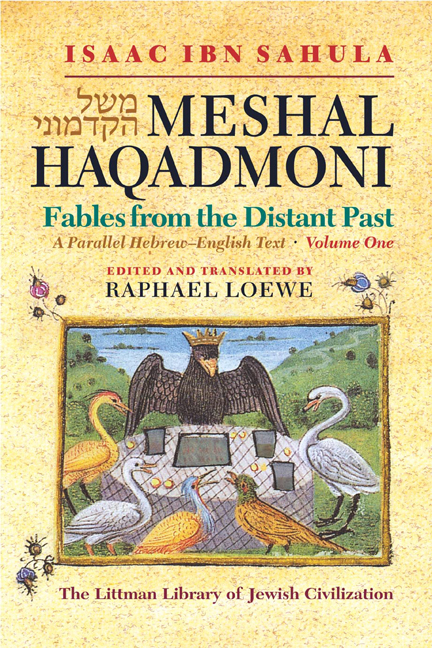Book contents
- Frontmatter
- Epigraph
- Publisher’s Note
- The Illustrations
- Preface
- Contents
- List of Abbreviations
- Introduction
- MESHAL HAQADMONI
- Part I On Wisdom
- Part II On Penitence
- Part III On Sound Counsel
- Part IV On Humility
- Part V On Reverence
- Appendices
- Bibliography
- Index of Citations
- Index of Key Hebrew Terms
- Index of Subjects
Appendix 2 - Supplementary Notes to the Poem
- Frontmatter
- Epigraph
- Publisher’s Note
- The Illustrations
- Preface
- Contents
- List of Abbreviations
- Introduction
- MESHAL HAQADMONI
- Part I On Wisdom
- Part II On Penitence
- Part III On Sound Counsel
- Part IV On Humility
- Part V On Reverence
- Appendices
- Bibliography
- Index of Citations
- Index of Key Hebrew Terms
- Index of Subjects
Summary
Introduction
note 15 Aristotle states that if the parts of the soul are distinguished according to its faculties, they are the nutritive, the sensitive, the rational, the deliberative, and the desiderative (i.e. five in all; cf. De anima, 3.7. 431a, 1.4). Earlier in the same treatise, Aristotle states that what is capable of perceiving is so in virtue of potentiality only; 2. 5. 4177a, ll. 6-8; 2. 12. 424a, l. 24. For Averroes—whose commentary on the De anima would have been available to Ibn Sahula—the soul is ‘from one point of view unitary, from another multiple’; Tah–lis kitab al-nafs, p. 49 (Spanish trans., S. Gómez Nogales, La psicología de Averroes, 166; Latin version (Aristotelis opera cum Averrois commentariis), Suppl. II, p. 194b, on 3. 10). A Hebrew version of Aristotle's De anima, made by Zeraḥyah Ḥen in Rome in 1284, could not have been available to Ibn Sahula, but Hebrew translations of Averroes’ treatment of Aristotle's work, by Moses Ibn Tibbon, were already in circulation; Sepher kelaley hanephesh, 1244, and Be_ur sepher hanephesh, 1261 See ‘Translation and Translators’, EJ xv. 1322. section G (A. S. Halkin); Steinschneider, Hebräische Übersetzungen, 146, 68.
Preface
note 13 S. of S. 5: 12 is rendered in the NEB: ‘His eyes are like doves beside brooks of water, splashed by the milky water [lit. ‘washing in milk’, as they sit where it is drawn’ (the Hebrew of the last phrase, is obscure). However, Ibn Sahula will have been so familiar with the allegorical paraphrase of the S. of S. by the Targum, which is read in the Sephardi tradition paraliturgically on Passover, that he will doubtless have equated its exegetical rendering with the ‘literal’ meaning of the Hebrew original. The verse is rendered by the Targum as follows: ‘God's eyes are fixed beneficently upon Jerusalem, like doves looking into the water channels, for the sake of scholars who sit in the court of the Sanhedrin engaged in the study of the Torah and clarifying their judgement, so as to make it run smooth as milk’.
- Type
- Chapter
- Information
- Meshal Haqadmoni: Fables from the Distant PastA Parallel Hebrew-English Text, pp. 735 - 766Publisher: Liverpool University PressPrint publication year: 2004



